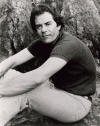| Cast |
1968 (play) |
1970 (movie) |
2020 (movie) |
| Director |
Robert Moore |
William Friedkin |
Joe Mantello |
| Harold celebrates his birthday. In the character's own words an "ugly, pock-marked Jew fairy",[5] he becomes increasingly morose about losing his youthful looks and claims that he no longer can attract cute young men. In the dramatis personae, he is described as being "dark" with an "unusual Semitic face".[6]
|

Leonard Frey |

Leonard Frey |

Zachary Quinto |
| "Cowboy", an attractive blond hustler who is "not too bright"[7] and "too pretty",[6] is one of Harold's birthday presents.
|

Robert La Tourneaux |

Robert La Tourneaux |

Charlie Carver |
| Alan McCarthy, Michael's married college friend[8] and roommate, is an unexpected party guest. He is visiting New York and anxious to tell Michael something, but hesitant to do so in front of the others. It is suggested that he once had homosexual affairs while in college, but his sexual orientation is never explicitly stated, leaving it to audience interpretation. The dramatis personae describes him as "aristocratic" and "Anglo-Saxon".[6]
|

Peter White |

Peter White |

Brian Hutchison
|
| Michael is Harold's "smartly groomed"[6] "frenemy",[8] the host, and a lapsed Catholic as well as an alcoholic. He is the catalyst for most of the drama of the play.
|

Kenneth Nelson |

Kenneth Nelson |

Jim Parsons
|
| Donald is Michael's conflicted boyfriend who has moved from the city to the Hamptons to spurn the homosexual "lifestyle", and is undergoing psychoanalysis. He has "wholesome American good looks".[6]
|

Frederick Combs |

Frederick Combs |

Matt Bomer |
| Bernard is an African-American librarian who still pines for the wealthy white boy in whose house his mother worked as a maid. In the dramatis personae, he is "Twenty-eight, Negro, nice-looking".[6]
|

Reuben Greene |

Reuben Greene |

Michael Benjamin Washington |
| Emory is a flamboyant and effeminate interior decorator. He is often campy in his sense of humor, which serves to irritate others.
|

Cliff Gorman |

Cliff Gorman |

Robin de Jesús |
| Larry is a commercial artist who prefers multiple sex partners and is "extremely handsome".[6]
|

Keith Prentice |

Keith Prentice |

Andrew Rannells |
| Hank is Larry's live-in boyfriend who has been married to a woman from whom he is separated and is divorcing. He "passes" as straight and disagrees with Larry on the issue of monogamy. Physically, he is described as "solid, athletic, attractive".[6]
|

Laurence Luckinbill |

Laurence Luckinbill |

Tuc Watkins
|




























